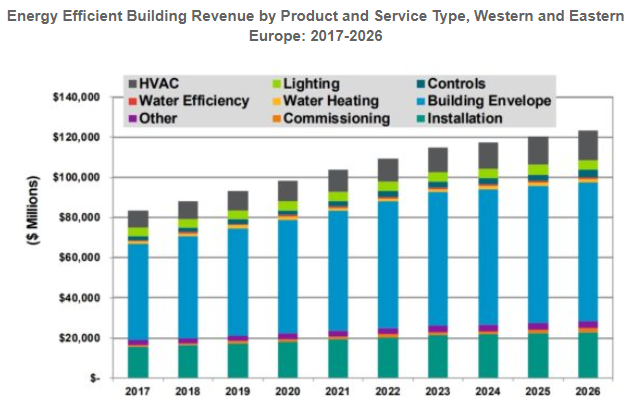Europe will be spending $112 billion on energy efficient building technologies in 2026
Navigant Research published its new report “Market Data: Energy Efficient Buildings – Europe”, where it analysed the markets for energy efficient building technologies in Western and Eastern Europe and it found that the market is expected to grow from $83.5 billion in 2017 to $111.9 billion in 2026.

Navigant Research published its new report “Market Data: Energy Efficient Buildings – Europe”, where it analysed the markets for energy efficient building technologies in Western and Eastern Europe and it found that the market is expected to grow from $83.5 billion in 2017 to $111.9 billion in 2026.
The study focused on 7 product types, i.e. HVAC, lighting, building controls, water efficiency, water heating, building envelope, and other and 2 service types, i.e. commissioning and installation.
Tom Machinchick, Principal Research Analyst at Navigant Research commented: “Europe has been a global leader in sustainability legislation and initiatives, with commercial buildings playing an essential role in meeting ambitious targets set for 2020”.
He added: “Intelligent digital building technologies will be necessary for Europe to continue toward its long-term goals of significantly increasing efficiency while reducing overall carbon emissions”.
“A certain level of efficiency can be attained with relative ease, but as future efficiency targets get deeper, so must the building efficiency projects and the technologies that support those efforts”.
Europe is already considered a global leader in the field, with the European Union having exhibited its commitment through two key legislation tools to reduce emissions in the building sector, the Energy Performance of Buildings Directive (EPBD) and the Energy Efficiency Directive (EED).
However, energy efficiency priorities in Eastern Europe often lie in the more unreliable and inefficient energy infrastructure versus in buildings, but interest in developing more robust mechanisms to facilitate building efficiency in the region is already growing.
The largest share of revenue will continue to be through the building envelope, followed by installation, and HVAC.
Source Navigant
The success of EU to realise deeper building efficiency targets while retailing gains will rely upon the evolution of intelligent building technologies.
As the research noted, advancements in intelligent building technologies are now evolving toward an integrated ecosystem of components and sensors that work together as a platform for optimising facility operations.
Last month, the European Commission launched the pilot phase of ‘Level(s)’, a voluntary reporting framework using existing standards in order to assess the environmental performance in the built environment.
You can access the Executive Summary of the “Market Data: Energy Efficient Buildings – Europe” report here.







